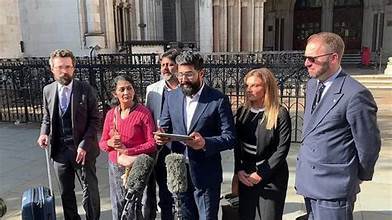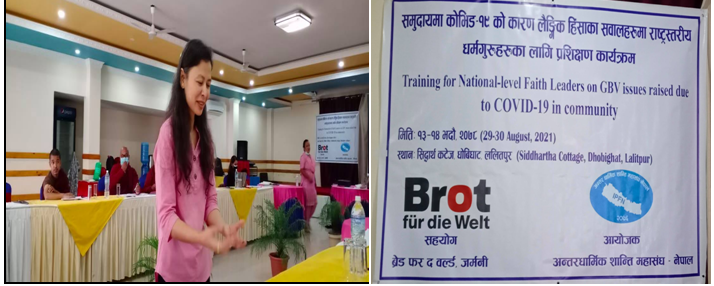Hospital reporting restrictions lifted as Sudiksha’s family appeal ruling-
Queen Elizabeth Hospital Birmingham was the NHS outlet

November 25-
The reporting restrictions which prevented the naming of Queen Elizabeth Hospital Birmingham as the NHS outlet responsible for the care of 19-year-old, Sudiksha Thirumalesh, have been lifted.
The lifting of the ‘transparency’ order came as Sudiksha’s family–supported by the Christian Legal Centre–also won permission to appeal a High Court judgment which ruled that the courageous young woman was ‘delusional’ for wanting to ‘die trying to live.‘
Granting the family permission, Lady Justice King said: “There is a real prospect of an appeal succeeding and there are compelling reasons for these important issues to be considered by the Court of Appeal.”
Sudiksha had been locked in a legal battle over her care with University Hospitals Birmingham NHS Foundation Trust for over six months, and tragically died on September 12, 2023.
Suffering from a rare genetic mitochondrial disease, she was still fully conscious and able to communicate with her own lawyers, explaining that she wanted to pursue the opportunity of specialist treatment in Canada. The treatment was her only chance of survival.
Sudiksha’s disease caused chronic muscle weakness, loss of hearing, and damage to her kidneys, making her dependent on regular dialysis and other intensive care. It did not, however, affect the functioning of her brain.
Her tragic case was reminiscent of Charlie Gard, Alfie Evans, Archie Battersbee, and now, Indi Gregory, in that an NHS Hospital had asked the Court of Protection to authorise removal of life-saving medical treatment from Sudiksha, effectively condemning her to death.
‘Actively dying’
Queen Elizabeth Hospital Birmingham argued that while Sudiksha’s prognosis was uncertain and she could have survived for some months, her condition was deteriorating, and she was therefore “actively dying.”
The NHS Trust had asked the Court to approve a “palliative care plan” for Sudiksha which would mean she no longer would be given dialysis and would die from kidney failure within a few days.
However, two psychiatric experts examined Sudiksha and told the Court that she was not suffering from any mental health illness and had the mental capacity to make decisions about her own medical treatment.
Sudiksha told psychiatrists she disagreed with the doctors and wanted them to continue to sustain her life.
She wanted to be given a chance to participate in clinical trials of nucleoside therapy, which are due to resume in Canada later this year and would have given her a chance of survival.
While she realised that the experimental treatment might still fail to save her, she said that she “wanted to die trying to live.”
However, the Queen Elizabeth Hospital Birmingham doctors argued that Sudiksha’s refusal to trust the judgment of her doctors and to accept her imminent death as inevitable amounted to a “delusion.”
In a judgment released on the 25 August, Mrs Justice Roberts ruled that the decisions about Sudiksha’s life and death should be taken by the Court of Protection based on an assessment of her best interests, and that Sudiksha lacked capacity to have a say in the matter via her own lawyers.
The judge rejected the opinion of both psychiatric experts, and concluded that Sudiksha was mentally incapable of making decisions for herself because she did not believe what Hospital doctors said about her condition.
Justice Roberts concluded: “In my judgment … Sudiksha is unable to make a decision for herself in relation to her future medical treatment, including the proposed move to palliative care, because she does not believe the information she has been given by her doctors.” [para 93]
Sudiksha grew up in a tightly knit Christian family who spent all their savings to pay lawyers to resist the legal proceedings brought by the NHS to end her life.
Despite her illness, she attended a regular school, achieved good GCSE results and was studying for her A levels when her health deteriorated after catching Covid in August 2022. She was taken to an Intensive Care Unit and remained there until her death.
In November 2022, Sudiksha issued Lasting Powers of Attorney to authorise her parents to make decisions on her behalf in the future if she was to lose mental capacity to do so.
In February 2023, the Hospital asked the Court of Protection to set aside the document on the grounds that she did not have mental capacity to sign it.
The Queen Elizabeth Hospital Birmingham then made a further application to approve a palliative care plan, said to be in Sudiksha’s ‘best interests’, which would lead to her death within a few days.
Like the family of Charlie Gard, Sudiksha’s only hope of cure was the experimental treatment known as nucleotide therapy, which is only available abroad. Her family wanted to appeal to the public to raise funds to enable her to participate in a clinical trial in Canada, scheduled to start in late 2023.
Transparency order
However, in March 2023, the Court made a “Transparency Order” which, opposite to its title, imposed draconian restrictions on reporting any information which might lead to identification of Sudiksha, members of her family, or the Queen Elizabeth Hospital Birmingham.
This prevented Sudiksha and her parents from giving any direct media interviews or making any appeal for funds. The Transparency Order was made at the request of the NHS Trust without any justification.
Days before her tragic death on 12 September, Sudiksha was able to tell her anonymised story to the media.
Despite her death, the family were still unable to name their daughter as anything other than ‘ST’. They even feared telling family members that she had died due to the threat of criminalisation that the Court Order still posed.
On 22 September, Mr Justice Robert Peel, at a hearing at the High Court, however, lifted the restrictions on her being named and at another hearing allowed the naming of University Hospitals Birmingham NHS Foundation Trust.
It was revealed that week that a BBC investigation had found that the same Trust has a ‘toxic’ and ‘mafia-like‘ working environment and is the lowest performing in the country.
Mr Justice Peel, however, stopped short of lifting the restrictions on the naming of the Hospital and the clinicians involved in Sudiksha’s care, granting an 8-week ‘cooling off period.’
On November 17th the final restrictions were lifted, allowing Queen Elizabeth Hospital Birmingham to be named, along with treating clinicians.
The family will now also have the opportunity to appeal Mrs Justice Roberts’ ruling at the Court of Appeal, with a date yet to be confirmed.
Unfairly gagged
Sudiksha’s father, Thirumalesh Chellamal Hemachandran, said: “We are relieved to have the opportunity to appeal Mrs Justice Robert’s ruling. The ruling and restrictions left us and Sudiksha powerless and trapped. It was clear overreach from the NHS and courts, and we are determined to do everything we can for it to be overturned.
“Sudiksha had capacity until the end, and it was cruel for her to be told she was ‘deluded’ for wanting a chance to live. She was in a race against time to escape ‘the system’ and the certain death it wished to impose on her. The system succeeded, but we were determined for it to not be the end in fighting for justice for her.
“This system urgently needs to change, and we pray no one else will ever have to go through what Sudiksha and we as a family have been made to suffer this last year.
“We are relieved that the transparency order has been fully lifted and that we can tell the full story of what happened to us and Sudiksha.
“If it was not for those restrictions, our daughter might well still be alive. We were very disappointed that the Court decided to continue to gag us for another eight weeks to keep the identity of the Hospital and the clinician’s secret.
“We could not name the people who, in our darkest hour, made an already unbearable situation worse for Sudiksha and the whole family. When we needed help the most, these clinicians took us to court and secured a gagging order against us. A society and health service that is compassionate and truly accountable does not behave like this.
“We want some good to come out of what has happened to us. Yes, we want justice, but we also want there to be real and lasting reform to the system so that clinicians, backed by the courts, are not able to silence families and hide from the decisions that end the lives of the most vulnerable.
“Sudiksha said she wanted ‘to die trying to live’. This is what she did. We are so proud of her.”
Justice done in the light
Andrea Williams, chief executive of the Christian Legal Centre, said: “Justice is done in the light. Open justice ensures the best outcomes for all.
“The public is rightly concerned to know the truth about Sudiksha’s disturbing case and death. Now these restrictions have been lifted the case can be brought fully into the light.
“The attempt to justify those restrictions by fears of harassment or violence against the clinicians does not hold water. There is no evidence of such a risk in cases of this kind – certainly not in this case.
“The frequent use of court orders in end-of-life cases, which threaten families in the middle of tragedy with being criminalised if they break them, are being weaponised to silence criticism and accountability of hospitals and the NHS.
“We are pleased that the family now have the opportunity to appeal the ruling from Mrs Justice Roberts. The ruling rejected expert evidence backing that Sudiksha did have capacity to make her own decisions and ruled that she was ‘delusional’ for wanting to take the only chance she had to live.
“We will continue to stand with Sudiksha’s family as they pursue full justice for their daughter.”
Courtesy: Christian Concern
Hospital reporting restrictions lifted as Sudiksha’s family appeal ruling


